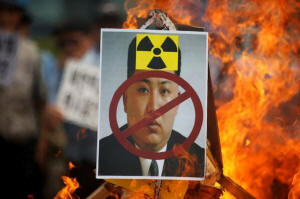|
South Korea says North's nuclear
capability 'speeding up', calls for action
 Send a link to a friend
Send a link to a friend
 [September 10, 2016]
By Jack Kim [September 10, 2016]
By Jack Kim
SEOUL (Reuters) - South Korea's foreign
minister said on Saturday that North Korea's nuclear capability is
expanding fast, echoing alarm around the world over the isolated state's
fifth nuclear test carried out in defiance of U.N. sanctions.
North Korea conducted its biggest nuclear test on Friday and said it had
mastered the ability to mount a warhead on a ballistic missile,
ratcheting up a threat that rivals and the United Nations have been
powerless to contain.
The test proved North Korean leader Kim Jong Un was unwilling to alter
course and tougher sanctions and pressure were needed to apply
"unbearable pain on the North to leave no choice but to change," South
Korean Foreign Minister Yun Byung-se said.
"North Korea's nuclear capability is growing and speeding to a
considerable level, considering the fifth nuclear test was the strongest
in scale and the interval has quickened substantially," Yun told a
ministry meeting convened to discuss the test.
The blast, on the 68th anniversary of North Korea's founding, drew
global condemnation.
The United States said it would work with partners to impose new
sanctions, and called on China to use its influence - as North Korea's
main ally - to pressure Pyongyang to end its nuclear programme.

But Russia was sceptical that more sanctions were the answer to
resolving the crisis, while China was silent on the prospect of a new
United Nations Security Council resolution, although state media did
carry commentaries criticising the North.
Under 32-year-old leader Kim, North Korea has sped up development of its
nuclear and missile programmes, despite U.N. sanctions that were
tightened in March and have further isolated the impoverished country.
The Security Council denounced North Korea's decision to carry out the
test and said it would begin work immediately on a resolution. The
United States, Britain and France pushed for the 15-member body to
impose new sanctions.
U.S. President Barack Obama said after speaking by telephone with South
Korean President Park Geun-hye and with Japanese Prime Minister Shinzo
Abe on Friday that they had agreed to work with the Security Council and
other powers to vigorously enforce existing measures against North Korea
and to take "additional significant steps, including new sanctions."
LAVROV SEEKS NEW TALKS
Russian Foreign Minister Sergei Lavrov said it may take more than
additional sanctions to resolve the crisis, signalling it may prove a
challenge for the Security Council to come to an agreement on new
sanctions.
"It is too early to bury the six-party talks. We should look for ways
that would allow us to resume them," Lavrov said.
The so-called six-party talks aimed at ending the North's nuclear
programme involving the United States, Russia, Japan, South Korea,
China, and North Korea have been defunct since 2008.
U.S. Secretary of State John Kerry said the United States had repeatedly
offered talks to North Korea, but Pyongyang had to accept
de-nuclearization, which it had refused to do.
"We have made overture after overture to the dictator of North Korea,"
he said, adding that he ultimately hoped for a similar outcome as in the
nuclear talks in Iran.
China said it was resolutely opposed to the test but Foreign Ministry
spokeswoman Hua Chunying would not be drawn on whether China would
support tougher sanctions against its neighbour.
On Saturday, the influential Chinese state-run tabloid the Global Times
said North Korea was wrong in thinking building nuclear weapons would
provide it more security or prestige in the world.
"Owning nuclear weapons won't ensure North Korea's political security,"
it said in an editorial. "On the contrary, it is poison that is slowly
suffocating the country."
[to top of second column] |

A cut-out of North Korean leader Kim Jong Un is set on fire during
an anti-North Korea rally in central Seoul, South Korea, September
10, 2016. REUTERS/Kim Hong-Ji TPX IMAGES OF THE DAY

"OUT OF CONTROL"
South Korea's Park said late on Friday Kim was "mentally out of
control," blind to all warnings from the world and neighbours as he
sought to maintain power. "The patience of the international
community has come to the limit," she said.
North Korea, which labels the South and the United States as its
main enemies, said its "scientists and technicians carried out a
nuclear explosion test for the judgment of the power of a nuclear
warhead," according to its official KCNA news agency.
It said the test proved North Korea was capable of mounting a
nuclear warhead on a medium-range ballistic missile, which it last
tested on Monday when Obama and other world leaders were gathered in
China for a G20 summit.
Pyongyang's claims of being able to miniaturize a nuclear warhead
have never been independently verified.
Its continued testing in defiance of sanctions presents a challenge
to Obama in the final months of his presidency and could become a
factor in the U.S. presidential election in November, and a headache
to be inherited by whoever wins.
North Korea has been testing different types of missiles at an
unprecedented rate this year, and the capability to mount a nuclear
warhead on a missile is especially worrisome for its neighbours
South Korea and Japan.
The Pentagon did not have evidence that North Korea had been able to
miniaturize a nuclear weapon, Pentagon spokesman Gary Ross said. But
he added, "given the consequences of getting it wrong, it is prudent
for a military planner to plan for the worst."

Jeffrey Lewis of the California-based Middlebury Institute of
International Studies said the highest estimates of seismic
magnitude suggested this was North Korea's most powerful nuclear
test so far.
He said the seismic magnitude and surface level indicated a blast
with a 20- to 30-kilotonne yield or its largest to date.
Such a yield would make this test larger than the nuclear bomb
dropped by the United States on the Japanese city of Hiroshima in
World War Two, which exploded with an energy of about 15 kilotonnes.
South Korea's military put the force of the blast at 10 kilotonnes,
which would still be the North's most powerful nuclear blast to
date.
"The important thing is, that five tests in, they now have a lot of
nuclear test experience. They aren't a backwards state any more,"
Lewis said.
(Additional reporting by Ju-min Park in Seoul, Ben Blanchard in
Beijing, Michelle Nichols at the United Nations, Phil Stewart in
Oslo, David Brunnstrom in Geneva; Editing Mike Collett-White)
[© 2016 Thomson Reuters. All rights
reserved.]
Copyright 2016 Reuters. All rights reserved. This material may not be published,
broadcast, rewritten or redistributed. |